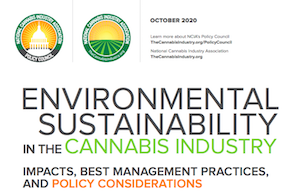Here’s their press release…
In-depth report analyzes existing problem areas in regulations and business practices, explores current best practices and steps to make cannabis industry an environmental leader
WASHINGTON, D.C. – The National Cannabis Industry Association (NCIA), the largest and most established cannabis trade association in the country, released a detailed report today to help tackle the unique environmental challenges facing businesses involved in regulated cannabis production and sale. The report, entitled Environmental Sustainability in the Cannabis Industry: Impacts, Best Management Practices, and Policy Considerations, was produced by NCIA’s Policy Council with the help of national experts in a variety of fields and covers the following primary issue areas: land use and soil health, water, energy, air quality, waste, and the impacts of the unregulated market.
NCIA-Environmental-Policy-BMP-October-17-final“The cannabis industry has the opportunity to be a trailblazer in environmental sustainability, but unfortunately it is being held back by lack of knowledge, unnecessary regulations, and onerous financial burdens which encourage the continued existence of unregulated markets and make it difficult for regulated businesses to implement the practices and technology they would like to use,” said Aaron Smith, co-founder and chief executive officer of the National Cannabis Industry Association. “We hope cannabis businesses and regulators will work together using this report to make our industry the environmentally responsible example for other industries to follow.”
“This fast-growing and highly regulated industry (at the state level) is poised to lead on evolving business challenges, including the adoption of environmentally sound business practices that demonstrate to the broader agriculture sector that comprehensive environmental sustainability is achievable,” the report reads. “Some of the challenges facing the cannabis industry present opportunities to implement environmentally sustainable practices. Companies that focus on sustainable practices reduce their resource dependence and associated costs, positioning them to outperform competitors in the long-term… NCIA suggests that forward-thinking standard-setting bodies, self-regulatory organizations, and government regulators take note and create workable standards with supporting resources to set the cannabis industry apart as a leader in environmental sustainability.”
“A successful, socially responsible cannabis industry will require best practices for environmental sustainability. This paper is a vital first step in that effort,” said Kaitlin Urso, lead author of the report and executive project and engagement manager for the Colorado Department of Public Health and Environment. “In Colorado, we’re always seeking out new strategies for improving the environmental sustainability of our local businesses. This is important, ongoing work that will benefit everyone. The NCIA’s paper on environmental sustainability is going to inform how we approach important questions related to the future of the cannabis industry.”
Cannabis is now legal for adults in 15 states as well as the District of Columbia and the territories of CNMI and Guam, and 36 states as well as several territories have comprehensive medical cannabis laws. The substance is legal in some form in 47 states.


















